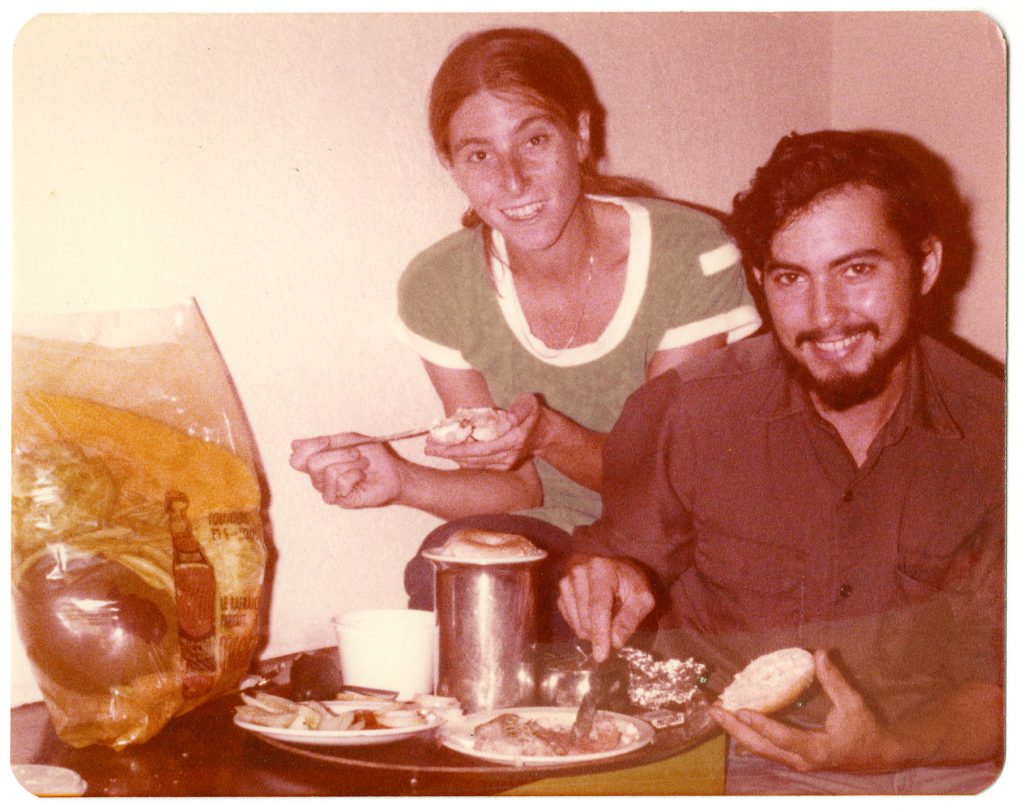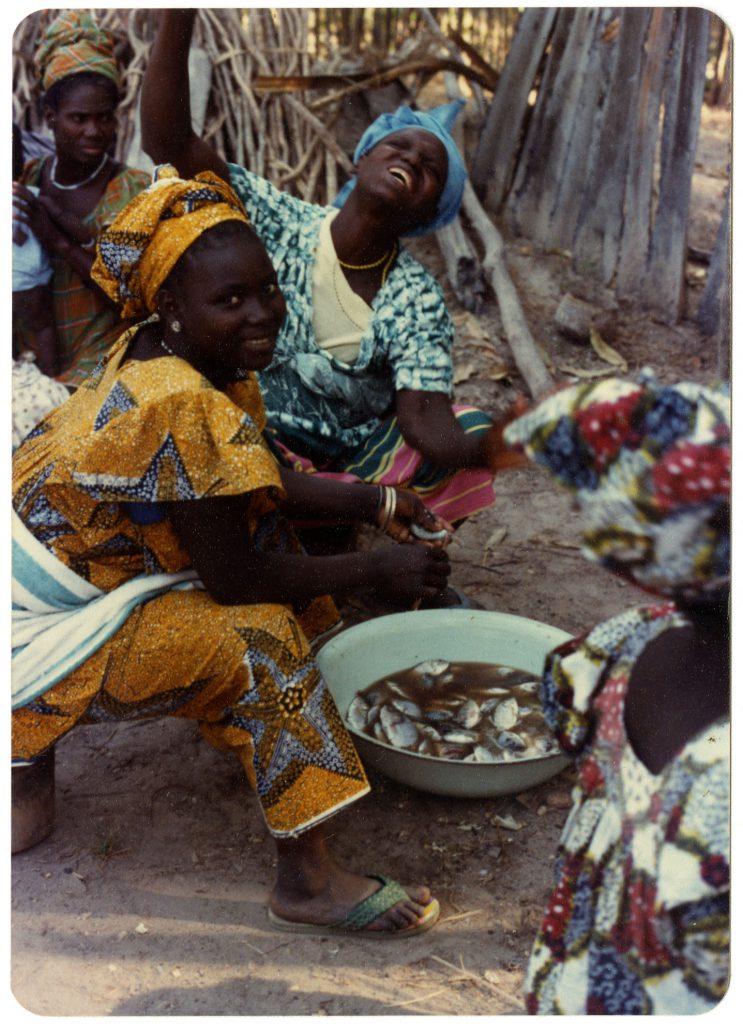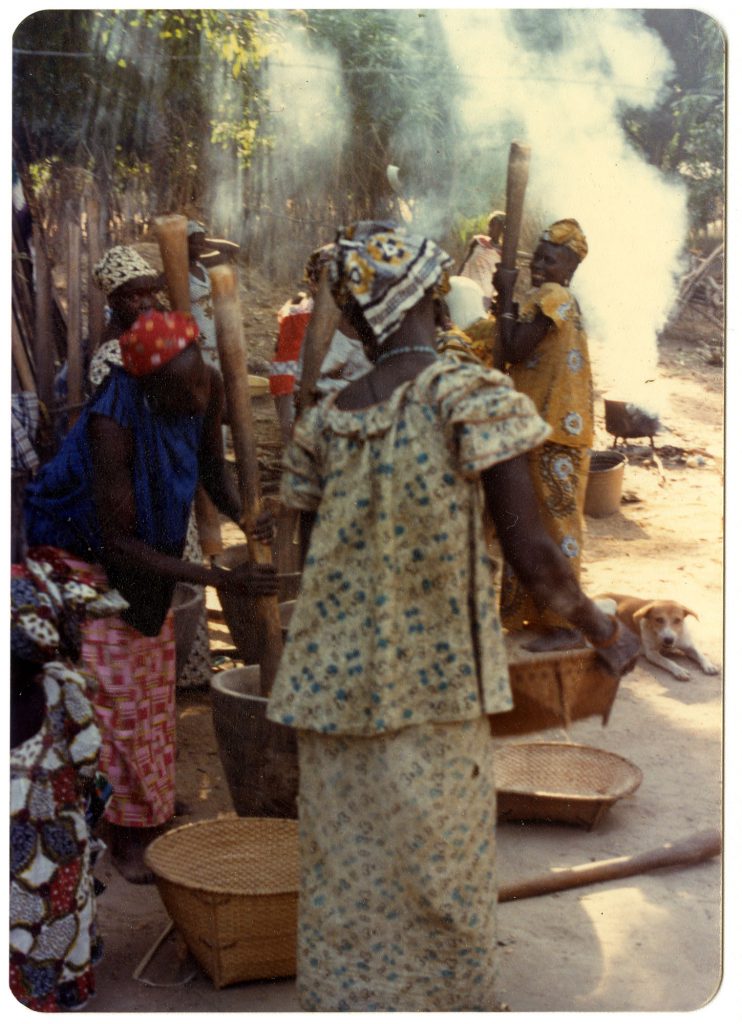The Peace Corps has always operated with a three-point goal in mind: serve host countries, introduce host countries to Americans, and to help Americans better understand non-Americans. [1] Peace Corps Volunteers do not stop fulfilling this third goal when they finish their service. One of the ways that Returned Peace Corps Volunteers (RPCVs) have accomplished this goal is by establishing organizations that work to help their country of service.
The American University Archives features materials from these organizations, whether donated by a Volunteer or the organization itself. Returned Peace Corps Volunteers often founded these associations in the final decades of the twentieth century. Many have the title “Friends of [Country of Service].” These groups provide a way for members who served together or in the same country to keep in touch. However, they also have a central focus on providing resources to and keeping American attention on their country of service. As such, they continue to fulfill the third goal of the Peace Corps.
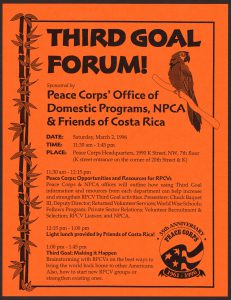
This flyer shows how the Friends of Costa Rica Organization clearly thought of themselves as fulfilling the Peace Corps’ third goal and wanted other RPCVs to do the same. Friends of Costa Rica, “Third Goal Forum!” 1996, American University Archives, Washington, D.C.
The Peace Corps Community Archive has materials from organizations for RPCVS from five countries: Colombia, Nigeria, Ghana, Kenya, and the Dominican Republic. A former fellow has written an amazing post about materials from the Friends of Nigeria, but the other four groups’ collections are also fascinating. Of especial note is the Friends of Colombia, which has been donating material since before the Peace Corps Community Archive began. The archive now has several decades of the organization’s materials, as well as the collections of dozens of Colombia RPCVs. These boxes are filled with stories, such as the organization’s founding, Colombian RPCV reunions, and donations and events that the group facilitated to help Colombians. However, Friends of Colombia has also worked to make a wider circle of Americans become more familiar with Colombians, such as through their participation in President Clinton’s 1992 inaugural parade. [2]
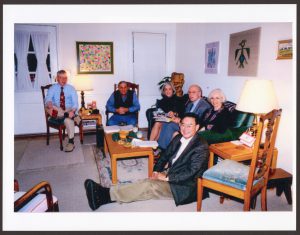
The founders of the Friends of Colombia in the living room where they started the organization. Photo undated, circa 2000. American University, Washington D.C.
While the archives does not have as much material from the Friends of the Dominican Republic, Ghana, or Kenya, these collections are still incredibly interesting. The Friends of Ghana organization has donated materials including meeting notes, newsletters, and the donation information. Members of the Friends of the Dominican Republic donated materials from their time assisting the organization (a list of members and related blog posts can be found here). Robert Scully donated materials from the Friends of Kenya. These groups also helped to facilitate connections between RCPVs, the country in which they served, and other Americans. For example, Robert Scully’s collection features Friends of Kenya materials from the 1990s and early 2000s, when he served on the organization’s board. During his tenure, the group donated to causes such as fighting polio in Kenya. Similar to Friends of Colombia, the group also interacted with Kenyans at the highest levels of government. This included the Kenyan ambassador to the United States, as seen below.
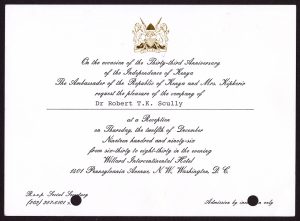
This is Robert Scully’s invitation to the thirty-third anniversary celebration of Kenya’s independence, courtesy of the Kenyan ambassador to the United States. American University Archives, Washington, D.C.
All of these organizations have also continued to carry out the Peace Corps’ third goal. The Peace Corps Community Archive has information on dozens of charitable projects that these five organizations alone have assisted. As shown above, these groups frequently have a great deal of influence due to their ties to the Peace Corps and former country of service. Meetings with ambassadors or other high-ranking officials from their countries of service, such as Scully’s, are not uncommon. Such work has made it more likely that other Americans will learn about their countries of service. These groups have all helped Americans, whether or not they are RPCVs, better understand non-Americans, therefore fulfilling a key Peace Corps purpose.
[1]”2020 Fact Sheet,” Peace Corps, December 2019, https://files.peacecorps.gov/multimedia/pdf/about/pc_facts.pdf.
[2] “Friends of Colombia (FOC) Activities,” c. 1996. American University Archives, Washington, D.C.

